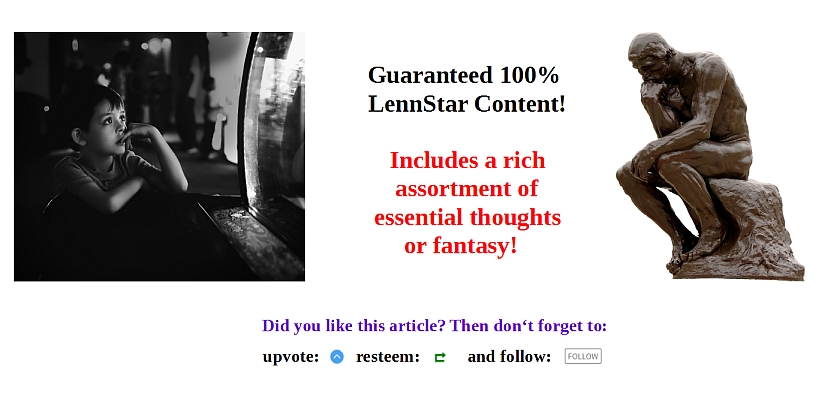Economically Useless
Did you feel the horror? The cold shiver going down your back? That is the feeling many people get when confronted with losing their job.
That feeling is not only about feeding their family, it is also a human need that is often underestimated: the need to feel useful.

In any economy, there are always people that are economically useless. That may be because of health reasons, age, knowledge or general inability for something. Not everyone can do quantum physics.
But what to do with those “useless” people?
There are basically two ways to cope with that.
One is to put them into work, either by training them and hope they get a job, or by just putting them into specially created work. Many of the socialist countries had a right to work, which was basically a duty.
Or we just subsidize the living of the economically useless people without pressing them into any work. We do that with old, chronically ill and disabled people for example.
Recently many voices have come out loud to widen the scope of financial resources for everyone: a Universal Basic Income.

Proponents often emphasize that this would allow people to do things that should be done, but aren’t because they are (in our current system) economically useless. That may be caring for old people for more than just basic bodily needs or by caring for the ecosystem instead of destroying it to make more profit.
Adversaries often say that an UBI would take away the dignity of being useful to the society by taking the people out of the work system. You would be told that you will never contribute.
I never found that argument convincing, since no UBI forces people to not work for others for money, but that is not the point I want to talk about today.
My question today is:
From a psychological point, which is better: UBI or Right to Work?

There is no question that being jobless is – statistically – an extremely bad thing. Both physical and psychical health is highly damaged and happiness drops like a stone.
But is that true for both voluntary and involuntary joblessness?
There is strong evidence that it is not the money that is the decisive point (this of course assumes you don’t have to hunger etc.), but loss of prestige, identity or self-worth.
This might indicate that the UBI is a bad idea. After all, that only addresses the money aspect, right? However, the loss of prestige and self-worth is because we as society put such a big point on “working”. If we would see that as a more or less optional point in the age of automatization, something you can do but not have to, than this loss would not exist.
Also, having an UBI can enable you to do something that gives you more prestige and self-esteem than would be able in a traditional job (Doctors without Borders might be a good example here, btw. not an useless, but economically damaging activity).
We should also not forget that very many people are unhappy with their jobs and only do them for the money. This strongly indicates that a Right to Work would not help much. However, a lot of that unhappiness is also basic human imperfectness, because often the people that are unhappy with their job aren’t even looking for a better one!
Generally people are happy when what they do allows them three things: autonomy, mastery, and purpose. If you want to get a bit deeper into this, watch this video:
So would these three things be achieved with an UBI or a RtW?
Autonomy
I think there is no question that an UBI would increase your autonomy. It basically allows you to say “Fuck you!” to everything, including bosses who want you to do unpaid extra shifts or do not know the word “thanks”. Maybe with an UBI the cleaning ladies would be paid double the money of car sellers, and rightfully so.
RtW would decrease your autonomy, because you would be more or less ordered to do something, and often that something would be what you do not want to do.
Mastery
This may be the trickiest one. Many people master things at work. They get good at the stuff they are working because they do it every day. And they might only do it every day because they have to work. If that external motivation goes away… let’s just say there are many people who have not mastered the art of dieting or stopping to smoke.
While a RtW would certainly increase some mastery, the same could be said about the UBI. Maybe only the UBI would allow you to continue learning something.
Purpose
This is the main problem in my eyes. Remember the people above lamenting about their job but not looking for a better one?
Many people find it incredibly hard to find a purpose in their lives. And that might be the biggest negative side of the UBI. That part of humans who now find purpose in their paid jobs might slack off if they don’t need to work at all cost to pay their costs. But always being in the bed is not making you healthy.
A RtW might give you purpose. On the other hand, most of those “jobs” in current programs are meaningless to downright useless. There is just no purpose in them except being there and doing something, even if it is coloring in picture books for children.
I don’t think that problem of RtW will ever be solved. Quite contrary, with increasing automation it is likely to increase, too.
What do you think? Which system can be better? Do you have a better idea?

I think UBI is the better option (and right to work, yet another form of slavery 😓).
According to most proposals I know, a UBI would only cover the bare necessities. It would not replace jobs altogether; only provide a foundation that lets you select your occupation more carefully.
Hating your job, and yet refusing to look for a better one? I don't think that happens, ever. Usually, when you stay where you don't feel welcome, it's because you have no choice--bills to pay, kids to feed, no free time to learn new skills or look for alternatives or risk losing the only support you have. A UBI would help with that--give just enough leverage, enough pause to consider different options.
It's not a perfect solution... Not even close. But definitely a step in a promising direction.
But that is why you look for a new job! To have a choice. Having job does not prevent you from looking for another. One that pays more, is closer...
Of course UBI would not give you the amount of an average income, not even a median. More like what is today minimum wage.
But the Right to Work schemes often pay even less than that.
Agreed. But allow me to clarify:
In some (many) cases, it practically does. Looking for a job requires time and effort. That job you don't want, but unfortunately need, might make you exhausted, or allow no time off for job interviews, or demand employee loyalty and actively discourage you from leaving.
You might stumble on a good opportunity despite all of the hurdles above, but that's far from certain. Instead, you would have to quit the current job, before looking for the next one. And that might not be an attractive option.